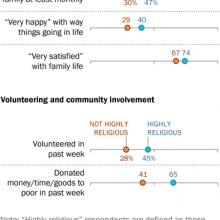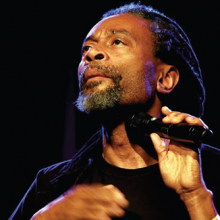happiness

Image via Pew Research Center / RNS
Look around. Three in 10 people you see claim they are pretty satisfied with life, happy, healthy, and moral, too. They’re the “highly religious,” 30 percent of U.S. adults who say they pray daily and attend church at least once a week.
I RECENTLY saw a photograph of me taken on the day I was born: two weeks premature, swaddled, peaceful, vulnerable, beautiful—pure potential. I wanted to travel back in time to give the little guy some advice and protect him. Most of all I wanted him to experience the things I missed—those that only seem to come to our attention with the benefit of hindsight. I wanted him to take more risks for the good, not worry so much, be more open to receiving love, take more walks in fields and on beaches, and avoid a thousand mistakes. I wanted him to be different.
While wanting to undo history is probably a human universal, it can also be a kind of psychic violence, emerging from the notion that there is such a thing as the person we were “supposed” to be. Indulging this notion led to me projecting it onto three intriguing films. Short Term 12 is a lovely, painful story of recovery from childhood wounds. In Seconds, the newly restored melancholic science fiction tale of human engineering from 1966, Rock Hudson brilliantly imagines what happens when you convince yourself that superficiality is depth and exchange the life you have for cosmetic “transformation.”
IN THE PAST 150 years, the songs historically known as “Negro spirituals” have worn many costumes. They emerged, of course, from the Deep South during the days of slavery, when songs such as “Every Time I Feel the Spirit” or “Wade in the Water” were first sung by anonymous psalmists wielding hoes or pulling cotton sacks. Since that time they’ve been dressed in the style of the European art song, sung as grand opera, or even faithfully mimicked by well-meaning white folk singers.
The spirituals entered the mainstream of American culture through the performances of the Fisk Jubilee Singers from Fisk University in Nashville who, fresh out of slavery themselves, toured the North in the 1870s. In the 1950s and ’60s, the old standards were resurrected, and slightly rewritten, as marching songs for the African-American freedom movement and then echoed across the world as anthems for human rights from South Africa to Northern Ireland to Eastern Europe.
After all that, the spirituals can probably even survive being remade into “smooth jazz,” which is more or less what happens to them on Bobby McFerrin’s new album Spirityouall. Readers of a certain age might remember McFerrin as the guy who, in 1988, conquered the known pop music universe with an airheaded ditty called “Don’t Worry, Be Happy.” The tune was so infectious that it should have had a warning label from the Centers for Disease Control, but instead it dominated radio, won some Grammys, and, to McFerrin’s eternal horror, was used as theme music by the George H.W. Bush presidential campaign.
THE DOCUMENTARY film The Economics of Happiness, produced by the International Society for Ecology and Culture, begins starkly, with full-screen titles that tell us we are facing an environmental crisis, an economic crisis, and a crisis of the human spirit. As the film goes along, it strongly suggests that those three crises are interrelated.
In the end, the filmmakers and their multicultural array of talking heads ask that we stop measuring human progress simply by economic growth and give priority to the quality of life, the health of communities and their cultures, and the sustainability of our economic practices. In short, they suggest replacing our mad rush toward globalization with a back-to-the-future move to “localization.”
Early in the film, writer-director-narrator Helena Norberg-Hodge tells us about the people of the remote Ladakh region of the Himalayas, one of the highest spots on earth to be inhabited by a settled human community. When Norberg-Hodge first visited the Ladakhis in the 1970s, she says, they were self-sufficient, healthy, and mostly at peace, with themselves and each other. Then came the great Western world with its bells and whistles and manufactured needs. Soon the people became dissatisfied with their traditional way of life and were driven to compete in a cash economy. Before long, there was open hostility between Muslims and Buddhists, who had co-existed peacefully for centuries, a fraying of the social fabric, and an atmosphere of gloom and depression.
Maybe someone pursuing a Ph.D. in Liturgical Theology and Ethnomusicology is shouldn't be the one to offer this reflection.
Heck, maybe a Ph.D. in Mechanical Engineering or in Astrophysics would be a wise economic choice. I can't say.
I've been mulling over some of the news stories out there hyping either end of the (political?) reality of spending more money (and time, let's not forget time) on higher education. It leads me to a couple of questions:
Does the present rate of student debt have a snowball's chance in Tartarus in being repaid? Will the students, especially the so-called "nontradtional student" like myself, actually see a return in their investment?
If you believe NPR, the answer may be "no."
THIMPHU, Bhutan — In a country that prides itself on measuring quality of life in terms of "Gross National Happiness," this small Buddhist kingdom in the Himalayas seems to have a problem: at least half its citizens aren't happy, according to its own measurements.
While more than 90 percent of the 7,142 respondents said they were "happy" in a recent government survey, only 49 percent of people fit the official definition of total happiness by meeting at least six of the survey's nine criteria.
Bhutan's fourth king, Jigme Singye Wangchuck, coined the phrase GNH in 1972 on the belief that people's happiness did not depend on the nation's economic wealth alone.
GNH indicators -- as opposed to more traditional measures like a nation's gross domestic product based on economic activity -- recognize nine components of happiness: psychological well-being, ecology, health, education, culture, living standards, time use, community vitality and good governance.

"Freedom." Photo illustration via Wylio http://bit.ly/xAJy0A
Just how free are we?
Freedom is a word often used by politicians, economists and others in positions of power/authority as a byword for happiness. The more freedom we have, the happier we are. Whether this is actually the case, freedom is something that oftentimes may not be particularly tangible.
Freedom House attempts to help us understand what freedom actually looks like in its annual publication, Freedom In The World, with the 2012 edition published today. And their focus? The Arab Uprisings and the impact they have had, and continue to have, on the world.
From the top-line data that Freedom House has collected, the news isn’t good. Despite seeing “the most significant challenge to authoritarian rule since the collapse of Soviet communism” during the past year, only 12 countries actually recorded an overall improvement in their freedoms, in comparison to 26 countries that saw their freedoms lessened.
It’s tempting for us to scoff at Kris and Kim’s downfall, but the reality is that their marriage failed at least in part because of our society’s views of nuptial bliss. That makes us all implicitly responsible, and it encourages us all to do a better job of loving our neighbors well, not just on their wedding day but on all the days that follow.
A new study says that might just be how it works, as long as the taxes are progressive. The study was conducted in 54 nations with over 59,000 respondents. The polling tracked the expressed well being of respondents and then checked for correlations in taxation systems. The end result? On average, those who lived in a country with a highly progressive tax system reported a higher level of quality of life, more positive daily experiences, and fewer negative ones. Overall, people are happier the more progressive their tax system is.
It's an academic paper and the authors don't jump to any political conclusions, but they do provide at least one plausible explanation. The study notes that simply increasing government spending does not increase overall happiness. But people are happier in countries with higher levels of progressive taxation because they are more satisfied with basic government services, such as quality of education and health care.
We have come to an impasse in the negotiations to raise the debt ceiling because of several conceptual errors in our public discourse. These errors were most glaring in the remarks recently delivered by Speaker of the House John Boehner in his response to President Obama. The largest conceptual error is the idea that the government of a constitutional representative democracy is different from the people. Boehner said, "You know I've always believed the bigger the government, the smaller the people."
What does this mean? The government is composed of the people, and if people are paying attention and voting according to their own interests, the government ought to work toward the happiness of the people. The problem is that too many Americans have bought into this conceptual error that the government is some kind of leviathan, a monster that exists to take away their liberties. This is nonsense. A correction of another conceptual error in Boehner's presentation makes my point.
[Continued from part 1] I have no idea how the United States will or can get out of the economic mess we've spent the last 50 years getting ourselves into. As individuals, though, we can take steps to avoid disaster.



